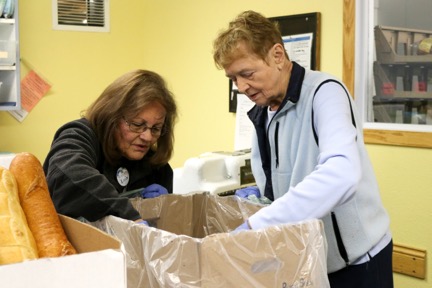A volunteer at the Crisis Center of Johnson County says taking calls from those in need has been a great experience.
I first learned the full scope of what the Crisis Center does for our community a year ago. Immediately, I was filled with admiration for its mission and its staff.
Simultaneously, though, I was filled with doubt whether I could possibly serve as a volunteer crisis-intervention specialist.
In this role, you spend one three-hour shift a week answering calls from or chatting online with people in various types of crises. I knew I wanted to help people, but I never knew what to say to my closest family when they suffered, let alone people I’ve never met. I backed away from the tough questions because I wanted to “give space.”
But since then, I’ve learned that people in crisis don’t need space. They need to know that someone is paying attention, is leaning in. And that’s what more than 100 volunteers do 24/7/365. They lean in. After all, no one should have to struggle alone.
One year ago, I took a leap and became a volunteer, and it’s one of the best decisions I’ve made.
RELATED:Johnson County plans for crisis-service center
Since that time, I’ve talked on the phone or chatted online with people actively considering suicide. I’ve listened to people as they grieve, as they face homelessness, as they fight mental illness. I still remember my first call, from a woman terrified for her son’s well-being. Her love and her pain so clear in her voice, I wished hard for things to get better for them, for the world to set itself right. It frustrates me that we can’t do that for the people who reach out to us, set the world right. But that doesn’t mean we can’t help them shoulder the weight for a little while.
Sometimes, we direct people to resources and information. Other times, we can only offer our ears, our curiosity, and our empathy. That may seem small, but it’s not. I’ve received enough thank-yous and heard enough genuine relief in people’s voices to know that what volunteers do matters, even when the caller’s problems don’t have a ready fix.
The Crisis Center does everything possible to help its specialists feel confident and supported, starting with an eight-week training that offers a solid framework for grabbing hold when someone reaches out. The Crisis Center is staffed with call-room managers who answer questions, give insightful feedback, and support us after tougher interactions. They’ve got big hearts, and they’re a fun crew to spend time with each week.
RELATED: Guest opinion: Volunteering at the Crisis Center is needed, rewarding
I’ve joked to my family a couple of times that the training is, in part, training in leveling up as a human. I don’t always live up to that training, but being a volunteer has taught me a lot about how any of us could face a crisis, and that it’s OK — and sometimes essential — to reach out when times are hard. It’s taught me that there’s a lot more bravery and strength in our community than I ever knew.
Imagine knowing there’s a place you can go no matter what’s going on, a voice you can reach who won’t judge, won’t discredit, won’t skip past your pain to tell you what to do. Would you — will you — consider being a part of something like that?
We make our worlds bigger through our connections, and the Crisis Center has done that for me. They are always in need of volunteers to fill their many available shifts, and spring training is just around the corner. Just visit jccrisiscenter.org to apply.
– Nicole Vander Linden, Iowa City



